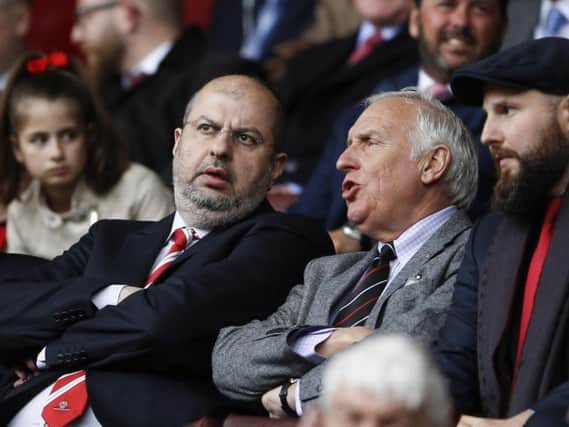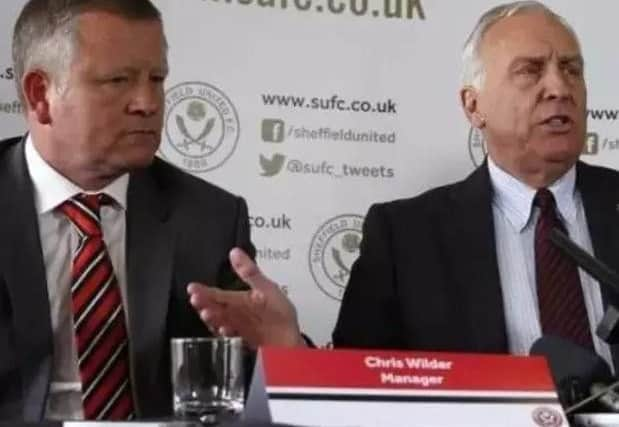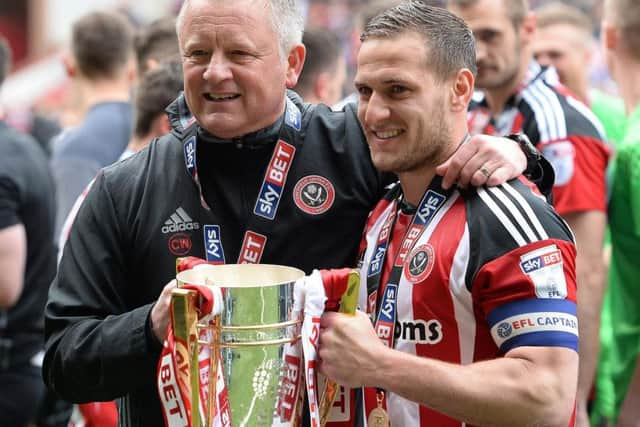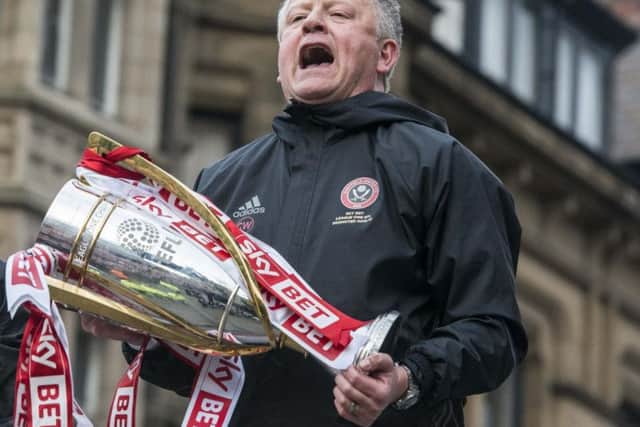Guest Blades Column: Kevin McCabe has transformed Sheffield United for the better - but must make a decision to protect his Bramall Lane legacy


Like Ken Barlow, Angela Merkel and Jools Holland, McCabe seems to have been around forever; so long, it’s rather difficult to imagine life without him at the Blades' helm. But like Hilda Ogden, Margaret Thatcher and Bruce Forsyth, his reign will end and he will be replaced. By whom, infers the gravest uncertainty and risk facing Sheffield United.
McCabe's predecessors Reg Brearley, Paul Woolhouse and Mike McDonald were not alone in having their much-publicised failings, within the pantheon of football club ownership. With its public profile, access to cash and, at the highest level, untold riches, football has long attracted those with a predilection for glitz and glamour over dedication and duty.


Advertisement
Hide AdAdvertisement
Hide AdThat’s not to tar all of McCabe’s predecessors with the same latrine brush. Brearley inherited a heavily indebted club in steep decline and oversaw a dramatic improvement in fortunes, due largely to his inspired appointment of Dave Bassett. Even Woolhouse, described by Bassett as “a Blade through and through,” was probably motivated by good intentions but was out-manoeuvred by the Brearleys and became over-stretched, financially.
The point is, pretty much every club has had its own version of ‘Reg, Paul and Mike’ down the years. Many left their ‘project’ in a more parlous state than any of the above named. By contrast, very few clubs have had the backing of a paternal benefactor and dyed-in-the-wool supporter like McCabe.
Having initially joined the Blades board under Len Brealey’s brief chairmanship in 1993, McCabe exited shortly after when brother, Reg returned. He then re-joined “the lion’s den,” in 1995 after an invitation from new chairman McDonald, buying a 10 per cent stake prior to the football club being purchased by the newly formed Sheffield United plc (now Sheffield United Ltd., which owns all of the Blades' real estate).
Judged crudely on league status, McCabe’s leadership has yielded no improvement. United were in the second tier when he effectively took charge in 1999 and, despite some toing and froing, remains so today.


Advertisement
Hide AdAdvertisement
Hide AdBut the league table is only part of the picture. In other key areas, McCabe has transformed United beyond recognition, with a stadium and Academy lauded amongst the best outside of the Premier League.
Investment in infrastructure projects only happens when there is a long-term vision for a football club. McCabe has invested consistently in ensuring United have facilities fit for a Premier League club, if and when that day arrives. Always one step ahead with planning consents, McCabe has never waited for the storm to arrive before fixing the Bramall Lane roof.
And there have been storms of biblical proportions during McCabe’s Blades epoch. Whether facing down the Premier League hierarchy over the Tevez case, defying popular public opinion in supporting Ched Evans or pacifying a baying mob in the Bramall Lane car park, McCabe has never hidden when the shoes are flying. He may not always be right - though with Tevez and Evans the law says he was -but he will always stand his ground and fight for the best interests of his Blades.
Of massive importance to McCabe and a huge swathe of Blades and Owls fans alike, is their team’s relative performance to their city neighbours. Over two decades, prior to the McCabe era, Wednesday dominated, finishing in a higher league position in 19 out of 20 seasons. During McCabe’s 18 subsequent seasons the balance of power has shifted markedly, with The Blades finishing as local, ‘top dogs’ 11 times versus Wednesday’s seven. Rightly or wrongly, this matters. It infects the psyche of supporters who live and breathe their football club, week in, week out.


Advertisement
Hide AdAdvertisement
Hide AdThe Blades’ support base has also strengthened considerably, despite too many years of on-field malaise and under-achievement. In 1999/2000, at the start of the McCabe era, the average home attendance was 16,000 following an eighth place finish in the second tier. The current average, playing at the same level, is over 26,000.
Whilst boss Chris Wilder’s revolution has clearly had an impact, this 60 per cent% increase hasn’t happened overnight and can hardly be attributed to an era of unparalleled success for The Blades (including six recent seasons in League One).
Rather, it owes much to vastly improved facilities and McCabe’s insistence on making football affordable to a new generation of supporters. Blades ticket prices have been consistently amongst the cheapest in whichever division they’ve played in and even in the current Championship season, on the back of a title-winning promotion, only five clubs offered lower priced season tickets.
Investment-wise, the McCabe family has committed more family silver to United than every previous owner, combined, in the club’s entire history. In 2016, McCabe suggested this amounted to around £90million, so today’s figure is presumably closer to £100million.


Advertisement
Hide AdAdvertisement
Hide AdEven for a man as wealthy as McCabe, this is an eye-watering amount to spend on a hobby. For someone as business savvy as the Blades owner, it is a demonstration of serious commitment to the cause (others would call it plain “crazy”).
McCabe has faced the wrath of supporters and taken flak from journalists. Some justifiably point out that a large portion of his money was burned on a succession of weak managers and executives, who he appointed. Others will point to the unfilled void between boardroom and coaching staff, created by Derek Dooley’s departure.
There is merit in those arguments but hindsight is a precise science. Of McCabe’s ten permanent managers, only Danny Wilson was a deeply unpopular choice amongst supporters, at the time of his appointment, while Nigel Adkins was broadly welcomed. Wilson (unwisely sacked) exceeded expectations, while Adkins (wisely sacked) proved bewildering and disappointing. McCabe’s other appointments, including Neil Warnock and Wilder, elicited an initially mixed reaction from supporters.
So much in football is about timing and had we not endured the Adkins era we would probably have missed out on Wilder, and subsequently the current sense of unity enveloping the Blades - amplified by the first team’s recent success but underpinned by the axis of steel running between owner, manager, captain and supporters.
Advertisement
Hide AdAdvertisement
Hide AdWilder and academy chief Travis Binnion embody McCabe’s preference for recruiting DNA Blades - talented people who care for their club as much as he does.
These are special times, probably unique and unquestionably fragile. Whether by luck or judgement (probably a combination of both) this has happened under McCabe’s watch.


So, what happens to The Blades once McCabe decides to move out of the boardroom and relinquishes the control he currently shares with Prince Abdullah? Here, McCabe faces a potential dilemma: does he sell to the highest bidder, as most business owners eventually do, or try to keep the club’s values intact? These two options are often, but not always, mutually exclusive.
Under the wrong ownership the social and emotional fabric of a club can be ripped to shreds before the ink is dry on the sale contract. Nothing can be assumed as sacred, whether it be a club’s colours or even its name, as supporters of Hull City, Cardiff City and AFC Wimbledon will surely testify. Even United, during the McDonald era, felt to me like a club that had been stripped of its soul and identity under owners who seemed immune to the club’s traditions and spared no empathy for its supporters.
Advertisement
Hide AdAdvertisement
Hide AdAs custodian of United for the best part of two decades, McCabe has acted with the long-term best interests of the club at the forefront of his mind. With the Premier League and all its riches within reach there will be no shortage of financiers seeing United as little more than an opportunity for personal glory and enrichment.
As he approaches his 70th birthday, McCabe’s great challenge is to find a way of securing his legacy of long-term investment in infrastructure and home grown talent, whilst protecting the values that make United special and different.